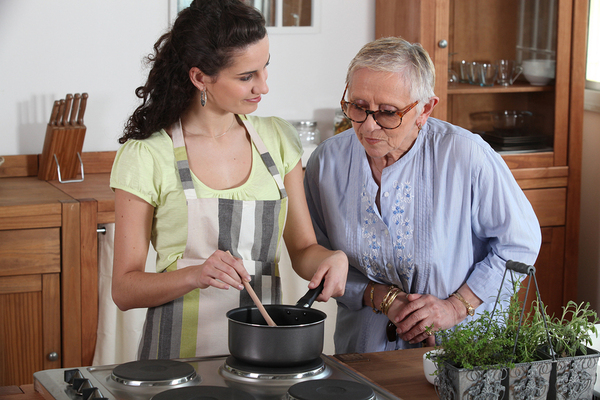 As many as five million American adults suffer from fibromyalgia, according to statistics from the National Institute of Arthritis and Musculoskeletal and Skin Diseases. And while living with this disease is difficult at any age, older adults often face heightened challenges. There’s no better time to shine the light on this complex condition than during May’s Fibromyalgia Education and Awareness Month. Here’s a closer look at the topic of seniors and fibromyalgia, along with management tips for caregivers.
As many as five million American adults suffer from fibromyalgia, according to statistics from the National Institute of Arthritis and Musculoskeletal and Skin Diseases. And while living with this disease is difficult at any age, older adults often face heightened challenges. There’s no better time to shine the light on this complex condition than during May’s Fibromyalgia Education and Awareness Month. Here’s a closer look at the topic of seniors and fibromyalgia, along with management tips for caregivers.
What is Fibromyalgia?
Fibromyalgia has been around for centuries but was only recently classified as a rheumatoid disorder rather than a mental one. Today, the Mayo clinic defines fibromyalgia as a “disorder characterized by widespread musculoskeletal pain accompanied by fatigue, sleep, memory and mood issues. Researchers believe that fibromyalgia amplifies painful sensations by affecting the way your brain processes pain signals.”
While fibromyalgia is not a type of arthritis, it is grouped with other arthritis conditions. Unlike arthritis, however, fibromyalgia neither causes inflammation nor damages joints, muscles, and tissues.
The primary symptom of fibromyalgia is widespread body pain which can occur with just a slight touch. Other symptoms may include sleep problems; difficulty focusing, AKA “fibro fog;” depression; headaches and lower abdominal cramping. Over time, these persistent symptoms can take a serious toll on overall quality of life.
Fibromyalgia usually strikes during middle age and can either come on gradually without a single triggering event or following a physical trauma, psychological stress, surgery or infection. While women are significantly more likely to develop the condition, men are also vulnerable to the disease. According to the Mayo Clinic, doctors have not attributed fibromyalgia to a specific cause, and in fact believe it involves several factors working together, including genetics, infections, and physical or emotional trauma.
Fibromyalgia and Older Adults
Fibromyalgia impacts different people differently. For older people, in particular, age-related physical changes and health problems can lead to additional complications when it comes to managing the condition. Not only that, but seniors may also be more vulnerable to pronounced fibromyalgia symptoms.
Because of this, particular attention should be paid when devising a treatment plan for older adults with fibromyalgia. As Benjamin H. Natelson, MD, director of the Pain and Fatigue Study Center at Beth Israel Medical Center, told Everyday Health, “Fibromyalgia tends to peak when the person is in their 50s, but symptoms can continue well into the 60s and 70s. Of course, as a person ages, she may be faced with health problems she didn't have before, and that can have a dramatic impact on how she and her physician approach her fibromyalgia therapy."
Helping Seniors Manage Fibromyalgia
Unfortunately, there is no cure for fibromyalgia. However, healthy lifestyle changes can help control its symptoms. Physicians recommend exercise and other stress-reducing activities as first-line therapies. Additionally, avoiding alcohol and caffeine can support healthy sleep, while eating right -- including plenty of vitamin D and whole foods -- can also help seniors with fibromyalgia feel better.
_600x.jpg)
If lifestyle changes aren’t enough, a number of medications are also used in the management of fibromyalgia symptoms, including pain relievers, muscle relaxants, antidepressants, and sleep inducers.
Seniors with fibromyalgia may also struggle with performing everyday tasks, such as cooking and cleaning, so caregivers can help by pitching in when needed.

One last thing to keep in mind? Fibromyalgia is often misdiagnosed as both polymyalgia rheumatoid arthritis and rheumatoid arthritis in older adults. While there is no clinical diagnostic test for fibromyalgia, the American College of Rheumatology has also established a set of preliminary diagnostic criteria based on tenderness at pressure points and the duration of symptoms. If you suspect that an older adult in your care may be suffering from fibromyalgia, check in with his/her physician, who will likely rule out other possible conditions before making a diagnosis of fibromyalgia.
mmLearn.org offers a large library of free videos for caregivers of older adults, covering topics pertaining to senior care, including on topics like chronic pain management for seniors. Whether you are a healthcare professional or a family caregiver, if you are caring for an older adult we know that you will find mmLearn.org an essential learning and guidance tool for all of your caregiver training needs. For more free caregiver training videos, access the mmLearn database today.
